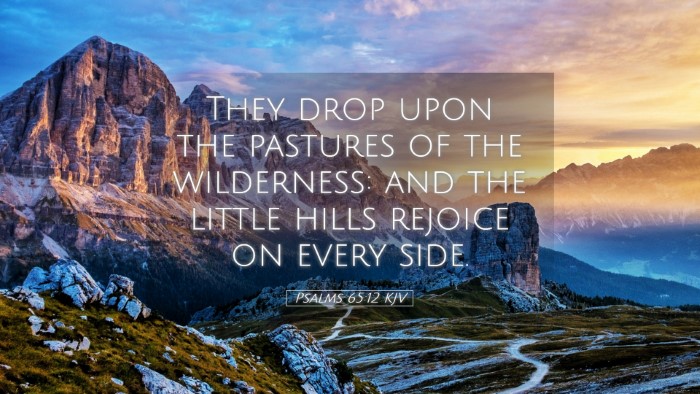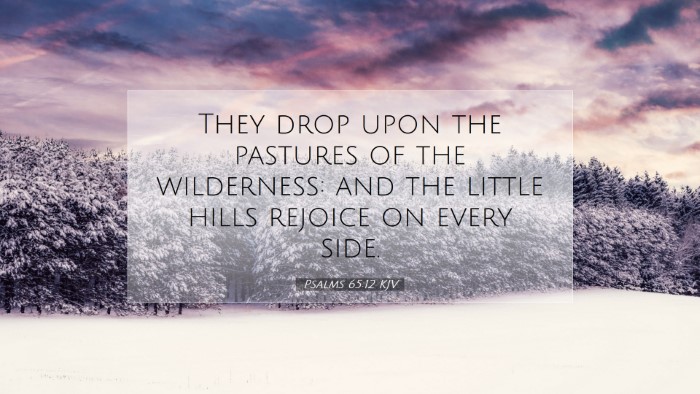Psalms 65:12 - Commentary Overview
Psalms 65:12 states, "They drop upon the pastures of the wilderness: and the little hills rejoice on every side." This verse captures the profound relationship between God’s provision and the transformative effect of His blessings on the natural world. This commentary draws insights from eminent theologians such as Matthew Henry, Albert Barnes, and Adam Clarke to provide a comprehensive understanding of this scripture.
The Context of Psalm 65
Psalm 65 is a song of praise celebrating God’s greatness and His provision in creation. It articulates themes of abundance, forgiveness, and divine grace. The psalmist invites the people to acknowledge God’s sovereignty over the earth, highlighting His role as the giver of life and sustenance.
Verse Analysis
Psalms 65:12 reflects the blessings upon the land that are a direct result of God’s favor. The imagery portrayed is vivid; it brings to mind fertile pastures and joyful hills, symbolizing the physical and spiritual replenishment that comes through divine grace.
Matthew Henry's Insights
Matthew Henry emphasizes the bounteousness of God, noting that the mention of 'pastures of the wilderness' implies that the most desolate places flourish under God's care. The 'little hills' represent the lesser aspects of creation rejoicing, a poetic personification of nature responding to divine provision. Henry connects this to the greater theme of God supplying the needs of His creation abundantly.
Albert Barnes' Commentary
Albert Barnes explores the metaphor of the 'wilderness' as a place typically seen as barren and lifeless. He indicates that God's grace can turn dry, inhospitable environments into thriving ecosystems. The phrase 'drop upon the pastures' can mean that blessings come gently from above, suggesting that God's provision is both nurturing and continuous. Barnes notes that the 'little hills rejoice' implies not just a physiological response, but a theological celebration of God's goodness.
Adam Clarke's Perspective
Adam Clarke approaches the verse with a focus on the theological implications of divine sustainment. He asserts that the 'drops' symbolize the regularity and certainty of God's mercy upon the earth, drawing connections to the covenant relationship between God and creation. Clarke interprets the 'little hills' not just as elevations of ground, but as representative of all creation's joy in realizing God's providence.
Theological Significance
The theological message in Psalms 65:12 is multifaceted. It not only praises God for His provision but also invites readers to recognize the interconnectedness of spiritual and physical realms. This verse serves as a reminder that God's blessings permeate all creation. For pastors and theologians, it emphasizes the importance of recognizing and celebrating God's role as the sustainer of life.
Application for Life
For believers today, Psalms 65:12 encourages a response of gratitude and stewardship towards God's creation. Acknowledging that all things are gifts from God inspires a sense of responsibility to care for the environment and to appreciate the beauty of the world around us. This also serves as an encouragement during difficult times, reminding us that, like the wilderness that blooms through God's favor, our lives can also experience renewal and joy.
- Gratitude: Cultivating a heart of thankfulness for God’s provisions.
- Stewardship: Taking care of God’s creation and recognizing the role we play in it.
- Joy in Creation: Finding joy in the natural world as a reflection of God’s character.
Conclusion
Psalms 65:12 serves as a profound testament to the relationship between God’s blessings and the flourishing of creation. Through the perspectives of Matthew Henry, Albert Barnes, and Adam Clarke, we gain a rich understanding of not only the verse itself but also its implications for our spiritual lives and our interactions with the world around us. This song of praise invites us to reflect on God’s goodness, challenge us to appreciate His creation, and inspires us to cultivate a life of stewardship and gratitude.


